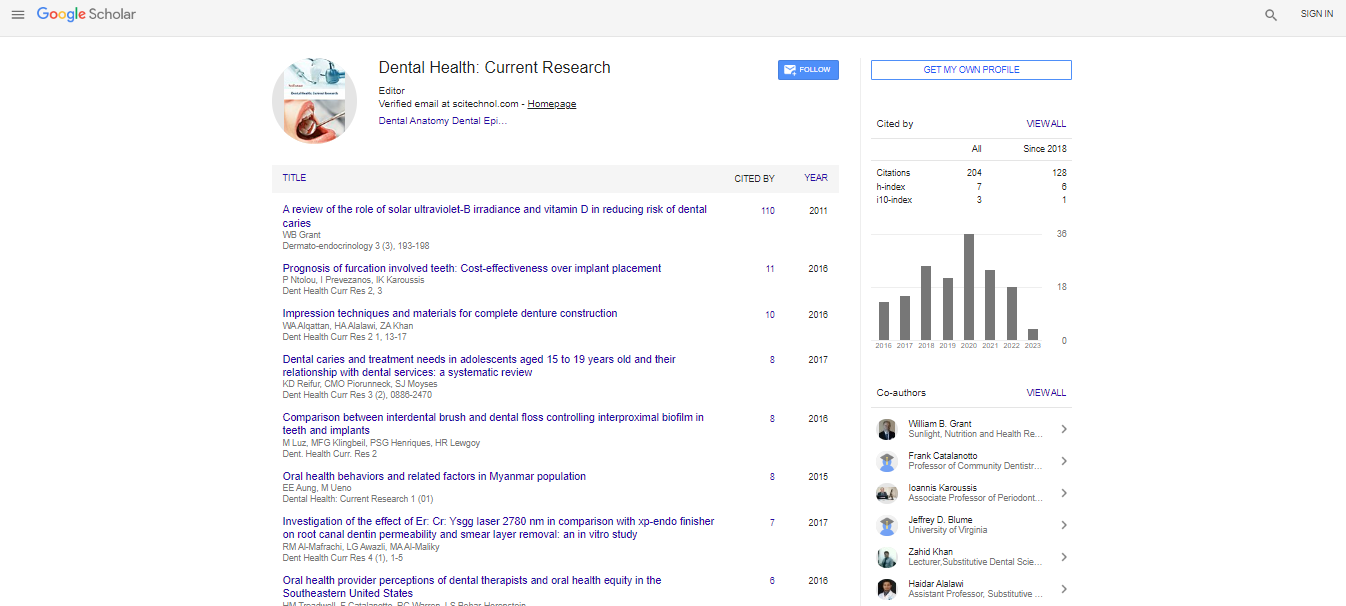Opinion Article, Dent Health Curr Vol: 9 Issue: 1
Exploring the Fundamentals of Dental Pharmacology: A Comprehensive Overview
Mariana Alves*
Department of Oral and Maxillofacial Surgery, AZ Groeninge, Kortrijk, Belgium
*Corresponding Author: Mariana Alves
Department of Oral and Maxillofacial
Surgery, AZ Groeninge, Kortrijk, Belgium
E-mail: alvesmar@azg.be
Received date: 22 March, 2023, Manuscript No. DHCR-23-98953;
Editor assigned date: 24 March, 2023, Pre QC. DHCR-23-98953(PQ);
Reviewed date: 15 April, 2023, QC No. DHCR-23-98953;
Revised date: 22 April, 2023, Manuscript No. DHCR-23-98953(R);
Published date: 28 April, 2023, DOI: 10.4172/2470-0886.1000151.
Citation: Alves M (2023) Exploring the Fundamentals of Dental Pharmacology: A Comprehensive Overview. Dent Health Curr 9:2.
Keywords: Dental Pharmacology
Description
Dental pharmacology plays an important role in oral healthcare, as it encompasses the study of drugs and their application in the prevention, treatment, and management of various dental conditions. Dental pharmacology serves as a cornerstone in dental practice, enabling oral healthcare professionals to effectively manage pain, control infections, and address various oral diseases. By understanding the pharmacokinetics, pharmacodynamics, and adverse effects of drugs, dentists can make informed decisions regarding drug selection, dosage, and patient management. Pain management is a difficult aspect of dental care. Analgesics, such as Nonsteroidal Anti-Inflammatory Drugs (NSAIDs) and opioids, are commonly used to alleviate dental pain. NSAIDs offer anti-inflammatory and analgesic effects by inhibiting cyclooxygenase enzymes, while opioids act on opioid receptors in the central nervous system to provide potent pain relief. It is essential to consider individual patient factors, such as allergies, drug interactions, and the potential for abuse, when prescribing analgesics. Local anesthesia is vital for pain control during dental procedures. Local anesthetics, such as lidocaine and articaine, block nerve impulses in the targeted area, preventing pain sensation. Understanding the pharmacology of local anesthetics is important for achieving effective anesthesia while minimizing the risk of adverse reactions, such as allergic responses and systemic toxicity. Dental infections, including dental caries, periodontal disease, and oral abscesses, often require antimicrobial therapy. Antibiotics, such as penicillin and amoxicillin, are commonly prescribed for bacterial infections, while antifungal agents like nystatin are used for fungal infections. It is essential to employ proper antibiotic stewardship to prevent the development of antibiotic resistance and minimize the risk of adverse reactions. Inflammatory conditions, such as gingivitis and periodontitis, necessitate the use of anti-inflammatory agents. Topical corticosteroids, like triamcinolone acetonide, can reduce inflammation and promote tissue healing. Nonsteroidal Anti-Inflammatory Drugs (NSAIDs) are also effective in managing oral inflammatory conditions, but their prolonged use should be monitored due to potential adverse effects. Several pharmacological agents contribute to oral health maintenance. Fluoride, in the form of toothpaste or mouthwash, helps prevent dental caries by strengthening tooth enamel. Chlorhexidine, an antiseptic mouthwash, reduces plaque formation and controls gingivitis. Dentifrices containing desensitizing agents like potassium nitrate and strontium chloride help alleviate tooth sensitivity. Advancements in dental pharmacology continue to shape the field of dentistry. Targeted drug delivery systems, such as antimicrobial varnishes and local anesthetic patches, offer improved efficacy and reduced systemic side effects. Furthermore, regenerative pharmacology explores the use of growth factors and biomaterials to promote tissue regeneration and enhance dental treatments. Dental pharmacology plays a vital role in contemporary oral healthcare, allowing dentists to effectively manage pain, control infections, and maintain oral health. Understanding the fundamentals of dental pharmacology empowers dental professionals to make informed decisions regarding drug therapy, maximizing patient care and treatment outcomes. As the field continues to evolve, ongoing research and advancements will further enhance dental pharmacology's impact on oral healthcare.
Conclusion
In conclusion, Dental pharmacology is vital for dental professionals. It equips them with the knowledge to make informed decisions in prescribing medications, managing pain, preventing infections, and treating dental conditions. Understanding the mechanisms of action, interactions, and therapeutic applications of drugs ensures optimal patient care and minimizes risks. Dental pharmacology enables dentists to tailor treatment plans, select appropriate drugs, and consider alternative therapies. By staying updated with advancements, dental professionals can provide safe, effective, and patient-centered care, leading to improved outcomes.
 Spanish
Spanish  Chinese
Chinese  Russian
Russian  German
German  French
French  Japanese
Japanese  Portuguese
Portuguese  Hindi
Hindi 